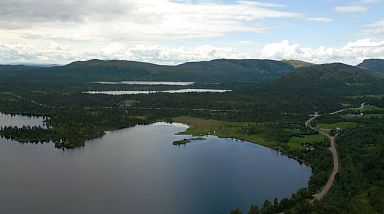Europe's only indigenous people are demanding their rights in Brussels, which are threatened by the ecological transition and the lack of EU policies.
The Sami people live in Lapland, in the far north.
 ADVERTISEMENT
ADVERTISEMENT
 ADVERTISEMENT
ADVERTISEMENT
They are fishermen, reindeer herders – about 80,000 of them. Many of the decisions taken in the European Union (EU) affect them directly, so they are taking part in a European project to forge closer ties. What do they expect from it?
Elle Merete Omma, head of the EU's Saami Council, hopes that they will be allowed to continue their traditional way of life, to continue using their language, to continue practising their culture and to have the right to stay where they are. "We have been here since time immemorial," says Merete.
Traditional Sámi houses are huts called "gahtie". They are made of birch branches, leaves and moss, allowing them to blend into the landscape. The link of respect and sustainability with the environment is characteristic of the Sámi, the only indigenous people recognised in Europe.
Their territory, which they call Sápmi, extends over two EU countries, Sweden and Finland, and two countries outside the EU, Norway and Russia.
Their way of life is linked to selling, fishing, renovation, handicrafts and is influenced by EU policies.
Sámi struggle for a place in Europe
The European project "Bridging the EU-Sámi knowledge gap" aims to strengthen mutual understanding and Sámi representation in Brussels.
Áslat Holmberg, president of the Saami Council, explains that the aim of the project is to work on issues such as the preservation of markets that sustain traditional Sámi livelihoods and to encourage collaboration in research.
"Moreover, youth participation is something we believe should be further developed here in the EU," adds Holmberg.
In these three countries, Norway, Sweden and Finland, the project has a total budget of 982,245 euros. Some €218,226 has been provided by the Interreg Norway programme and another €496,612 by Finland and Sweden through the EU Development Funds.
Travelling the world to preserve the Sámi tradition
In the Sápmi territory there are 9 languages and one song: "Yoik", which "paints" the soul of beings and landscapes at a given moment.
Marja Mortensson travels the world trying to preserve this tradition that describes what cannot be described in words.
"We have a saying that where words end, the yoik begins. I composed a Yoik for "Svahken", which is one of the biggest mountains in the region. The mountain is quite high and the back of the mountain has a gentle descent like the yoik," explains Mortensson.












